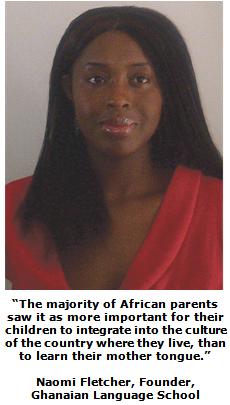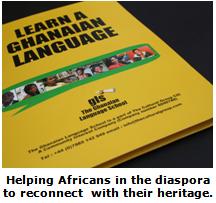 ReConnect Africa is a unique website and online magazine for the African professional in the Diaspora. Packed with
essential information about careers, business and jobs, ReConnect Africa keeps you connected to the best of Africa.
ReConnect Africa is a unique website and online magazine for the African professional in the Diaspora. Packed with
essential information about careers, business and jobs, ReConnect Africa keeps you connected to the best of Africa.



How the Ghanaian Language School is helping people embrace Ghanaian culture and enhance their knowledge.
 Founded by Naomi Fletcher, The Cultural Group is a group of companies designed to educate, inspire and uplift individuals through the development of cultural initiatives.
Founded by Naomi Fletcher, The Cultural Group is a group of companies designed to educate, inspire and uplift individuals through the development of cultural initiatives.
ReConnect Africa spoke to Naomi Fletcher about the school and how it is helping Africans in the diaspora to reconnect with their heritage.
ReConnect Africa (RCA): What was the inspiration behind setting up the Cultural Group?
Naomi Fletcher: My husband (who is also my business partner) and I are both British born Ghanaians and, despite growing up in a household where the language was spoken, we never learned it.
When we became adults and met each other it became increasingly important that we identified with this part of our culture. We both wanted to be able to speak with our family members when we went back to Ghana, with our parents and family here in England and, most importantly, with our children so that they too wouldn't grow up like us, being unable to speak their mother tongue.
We decided to ask our friends and family if they too faced the same problem. The majority of people came back with the answer 'yes' and so we started to put the plans in motion to form The Ghanaian Language School.
RCA: Why was the need to speak a Ghanaian language so important for you?
Naomi Fletcher: I have always been extremely passionate about my culture - the food, music and attire, among other things, and felt incomplete not knowing how to speak the language too.
I also believe that if you know (and by that I mean truly know) where you are from then you'll know where you are going.
RCA: How does the school operate and what kind of people are registering with you?
Naomi Fletcher: We run courses at 3 different levels: basic, intermediate and advanced. Each course last for 10 weeks, for 2 hours a week, on a weekday evening or weekend.
 The majority of people that register on the course are British born Ghanaians. We also have people who have married Ghanaians, people with Ghanaian friends; who like to holiday in Ghana, people who do business in Ghana, etc...
The majority of people that register on the course are British born Ghanaians. We also have people who have married Ghanaians, people with Ghanaian friends; who like to holiday in Ghana, people who do business in Ghana, etc...
RCA: What do you think are some of the barriers to Africans in the diaspora connecting with their culture?
Naomi Fletcher: I believe the initial barrier unfortunately is created by our parents. The majority of African parents saw it as more important for their children to integrate into the culture of the country where they live, than to learn their mother tongue. Some thought learning the language may be a hindrance to this, and made a conscious decision not to teach their children.
The good news is that we can break this pattern, we can choose to make the effort and learn, and eradicate the problem by passing the knowledge on to our young ones.
RCA: What other projects and initiatives are planned for the Cultural Group?
Naomi Fletcher: This year we have launched Fante language Courses and plan to start Ga classes soon too. We will also start running courses in additional areas throughout London.
In addition to this we are working on learning resources across multiple platforms to support learners.
RCA: What impact do you think the School has on those who are attending or have attended?
Naomi Fletcher: I am going to answer this question with a testimonial given by Michael Richardson, one of our students, and one that I believe most of our students would echo.
"I was told about the Ghana Language School by a friend as I was slowly getting frustrated when attempting to learn Twi.
{mosimage}I soon found that friends and family are not necessarily the best teachers. I knew I required a firm grounding in the foundational rules of the language. I signed up to the intermediate course as I was familiar with many words but struggled to speak and couldn't read or write.
The course was an excellent aid and allowed me to meet people who were in a similar situation, whilst learning and improving all aspect of my Twi. The course touched on many basic and compulsory areas and also went into deeper cultural aspects, which made the learning experience even richer. The tutor was very friendly, patient, experienced and would put most people's English (language and literature) to shame.
On a couple of occasions I suggested potential ways of improving the learning experience to the organisers who were extremely open and receptive to change, even implementing one change for the next class. The course gave me the confidence to continually improve my Twi (regardless of the blank faces I get, when I say a unintended word through bad intonation). I will get some more practice in and then go for the advanced course! I have recommend GLS courses to both novice and intermediate friends and family alike."
